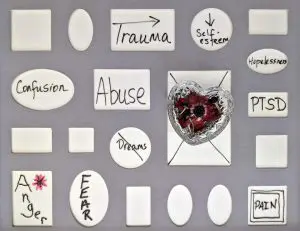
EMDR In a Flash!
The field of psychology has long been engaged in the quest to develop effective treatments for trauma and related disorders. One of the most significant
|
Schedule your Free Consultation or call 720-551-4553 |


Trauma is a prevalent issue that affects many individuals, just like you. It can stem from various experiences, ranging from acute events to prolonged exposure to distressing situations. This trauma often manifests in persistent emotional, psychological, and physical symptoms that can significantly hinder one’s quality of life. The impact of such experiences can be deep-rooted, causing continuous discomfort and distress. Our qualified team specializes in EMDR, a specific therapy for addressing trauma. We offer a complimentary consultation to gauge your objectives and pair you with a trained EMDR therapist who aligns well with your needs.
Experiencing trauma or PTSD often manifests in two distinct ways: either through a state of emotional shutdown characterized by feelings of dissociation, sadness, loneliness, and numbness, or through heightened responses such as anger, panic, hypervigilance, mood swings, and mistrust. These reactions can have a profound impact on your life, potentially leading to depression, substance abuse, anxiety, addiction, and strained relationships.
Acknowledging that you’re facing these challenges can be daunting, and the instinct might be to simply endure or ‘power through’ these tough times. However, conventional coping mechanisms may not always yield the desired relief. This is where therapy come into play, offering a path to navigate and manage these intense emotions and physical sensations, empowering you to regain control of your life.
EMDR (Eye Movement Desensitization and Reprocessing) therapy is a well-established treatment that has been proven to effectively alleviate the symptoms of trauma. This innovative approach is recognized internationally and endorsed by numerous mental health organizations for its effectiveness in helping individuals overcome the lingering effects of traumatic experiences.
Initially, EMDR was predominantly used to treat PTSD, especially in individuals who had experienced combat or other severe traumatic events. Over time it has been shown to be effective for a variety of mental health issues not directly related to combat trauma, such as:
EMDR therapy provides a secure environment for you to explore and process your experiences in a manner that may have felt inaccessible previously. Our approach is empathetic, accessible, and free from judgment. While EMDR follows a structured framework, we tailor our approach to suit the individual needs of each client.
EMDR therapy is a structured eight-phase treatment that includes elements from various therapeutic approaches. It focuses on the client’s past, present, and future aspects of disturbing memories. The core of EMDR involves the client focusing on a traumatic memory while simultaneously experiencing bilateral stimulation (typically eye movements). This process facilitates the brain’s natural ability to process and integrate traumatic memories, reducing their lingering effects significantly. Sessions typically last about 60-90 minutes, and the number of sessions varies depending on the individual’s needs.
Take a look at our blog article – 6 Ways EMDR Can Help You Live a More Positive Life
If you’re struggling with the effects of trauma, don’t wait any longer. Contact us today to begin your journey towards healing and reclaiming your life. Our experienced EMDR therapists are here to guide you through each step, offering a supportive and compassionate environment. Let’s work together to overcome the challenges posed by trauma and move towards a more peaceful and fulfilling life.
To get started, you can email us by using the contact page, or call 720-551-4553 for a free, 15-minute phone consultation.

The field of psychology has long been engaged in the quest to develop effective treatments for trauma and related disorders. One of the most significant

As the New Year unfolds, it presents an opportunity for personal growth, especially for those grappling with trauma or PTSD. The journey of healing and

EMDR therapy is a structured form of psychotherapy that helps individuals process and heal from traumatic experiences. It’s grounded in the understanding that the mind

Trauma occurs when a terrible experience or series of experiences cannot be fully processed. Those with such unresolved trauma often end up struggling with Post-Traumatic

Looking after your mental wellbeing should always be a priority, and this is particularly the case when yourself or someone else that you know is
